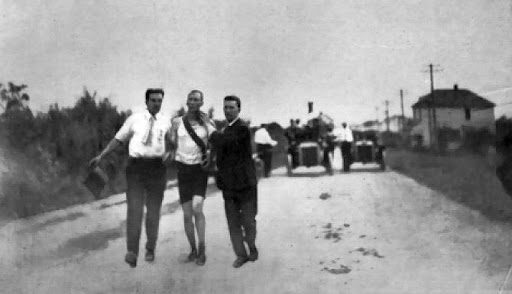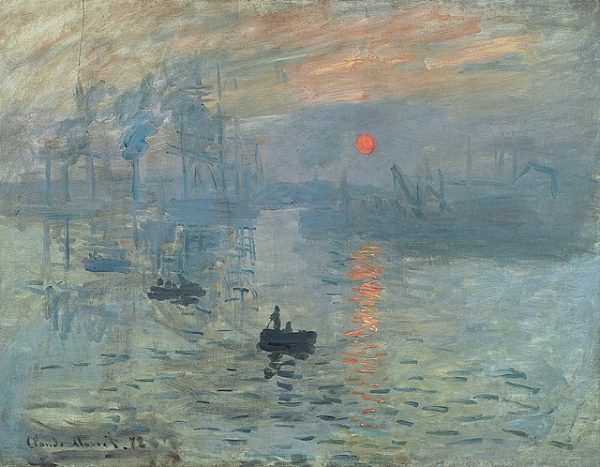Racing, Rat Poison and Road Dust

Thomas Hicks being carried to the finish line as he hallucinated from the rat poison. Photo by: Unknown (pulled from Wikipedia).
In the summer of 1904, St. Louis held the most disastrous Olympic Games in history. The Olympics was such a catastrophe that it put the entire future of the games at risk. In the beginning, The International Olympic Committee was planning to bring back the Olympics into the modern era. However, The Olympic Games became a laughing stock of the 1900s. This was mostly due to the 1900s France Olympics and the fact that France didn’t seem to have any resources for the games. With the swimming event being held in the River Seine and broken poles used as hurdles. It was also severely overshadowed by the World’s Fair.
In 1904, they decided to hold the games in St. Louis. This was after some arguments with Chicago due to some fear that the Olympics would look like a sideshow to the World’s Fair. They had planned to hold the World’s Fair in St. Louis and the Olympics in Chicago. But they muscled through it and held both events in St.Louis.
The 1904 Olympics had around 650 athletes, with only 12 countries participating. Of those 650 athletes, less than half were American and Canadian. For scale, the 2021 Summer Olympics had 206 nations and 11,656 athletes.
Because there were very few people playing, they had citizens from the streets participate. There was hardly any media coverage on the games because, as previously stated, it was in the shadow of the World’s Fair.
This all led up to a 24.85-mile marathon run. The course had around seven hills over a hundred feet tall. Some roads had loose stones and dust, but The Olympics didn’t close the roads, so the athletes had to be careful of trains and traffic. But the worst of it all was that the runners could not drink water. James Sullivan, the Chief Organizer of the games, said that he wanted to minimize fluid intake to see the effects of purposeful dehydration. This practice was rather common around this time. The only spots for water were at mile six from a water tower or a well along mile 12.
There were 32 runners in the race. In the race, there were notable people such as William Garcia, but he dropped out after collapsing on the road because his lungs and esophagus had been filled with dust from the roads, and he had ripped his stomach lining. There was also John Lordan, who had won the Boston race a few years prior. Despite people’s high expectations for him, he ended up dropping out at the first mile because he began vomiting.
However, the games featured the first players from Africa. Their names were Len Taunyane and Jan Mashiane, and they seemed to be doing well. Up until Mashiane was chased off the course by a dog (but he will come back later).
Thomas Hicks was a racer who had a training team driving next to him. The training team gave Hicks egg whites and rat poison as a drink, thinking it would enhance his performance. This, of course, didn’t go over well. But, it didn’t kill him. He was cramping up and limping as his trainers kept giving him the concoction along the way.
We also had Felix Carvajal, a mailman from Cuba. He had to hitchhike and walk around 600 miles from New Orleans to St. Louis after gambling all his money away and showed up to the race mere minutes before it started. In the race, he ended up stealing peaches from some drivers, who turned out to have been Hicks’s training team. A bit later, he went apple picking and stole apples, which made his stomach hurt due to them being rotten, so he took a nap in the middle of the race.
Another runner, Fred Lorz, hitchhiked in a car for 11 miles of the race and waved at the runners and watchers. Lorz ran the final five miles and finished the race in first place. The spectators were ecstatic because Lorz was American and had won. Just as Alice Roosevelt was about to give him the gold medal, they discovered he had cheated and became disqualified. So the place for number one was still open.
Hicks (The man given rat poison and egg whites) was coming towards the finish line, passing out and hallucinating from the strychnine. Hicks is quoted as saying, “Never in my life have I run such a touch course. The terrific hills simply tear a man to pieces,” and was pretty much carried over the finish line by his trainers.
Mashiane (who was chased off by dogs) got back on course and finished 12th place. While, Taunyane finished in ninth place, and Carvajal (the napping peach thief) finished in fourth place. Out of the 32 runners, only 14 passed the finish line, making this the most disastrous Olympic Game to date.
In an attempt to save the Olympics, they had another set of games in 1906, taking place in Athens, and that seemed to reignite the idea of the international athletics competition.

Hiya, I’m Kai. This is my fourth and final year of Journalism. I like playing video games, my favorites being Bioshock and Not for Broadcast. I have...











